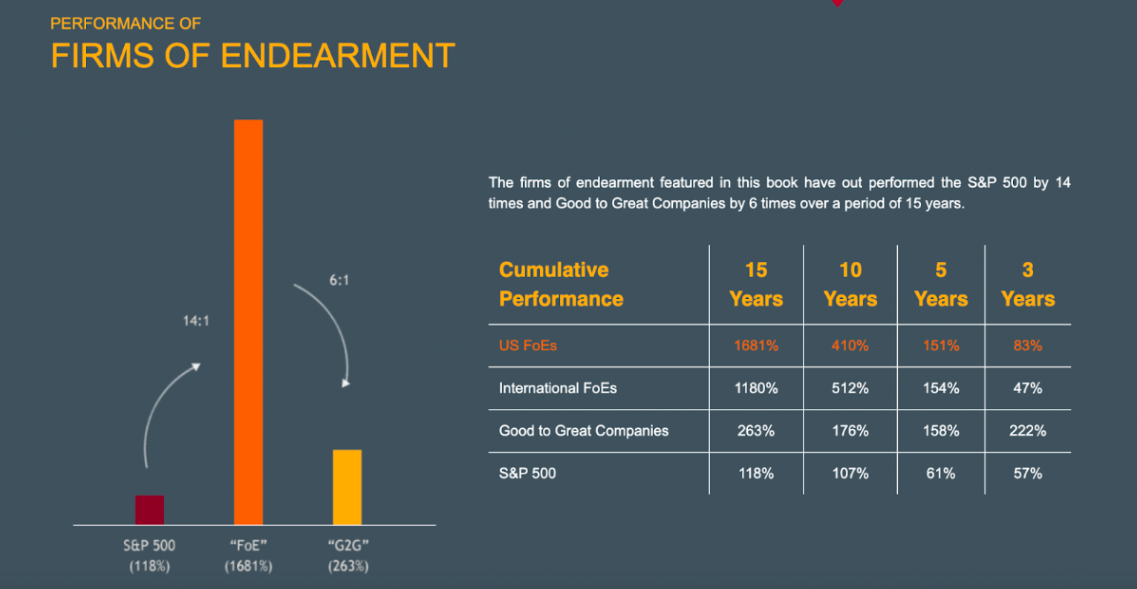5 Ways Stakeholder Capitalism Benefits Company Performance
Feb 12, 2023
By Meghan French Dunbar & Nathan Havey
In 1984, Edward Freeman published his book Strategic Management: A Stakeholder Approach, arguing that, paradoxically, the best way to create value for shareholders was actually to balance the interests of all company stakeholders, considering none to be more important than any other. In short, he was arguing for stakeholder business, a strategy that benefits multiple aspects of company performance.
Outperforming By a Landslide
Building on Freeman’s theory, in 2006, business professor Raj Sisodia and his team completed several years of research on companies dedicated to the stakeholder business model and published their findings in their book, Firms of Endearment. The research determined that the financial performance of these companies from 1998 to 2013 outperformed the S&P 500 by 14 to 1. Sisodia and his co-authors put it this way: “the ironic bottom line here is that focusing intently on the bottom line alone often leads to poor bottom-line performance.”
 For more on Raj Sisodia and Firms of Endearment, listen to Episode 2 of 10 Things You Should Know About Stakeholder Capitalism.
For more on Raj Sisodia and Firms of Endearment, listen to Episode 2 of 10 Things You Should Know About Stakeholder Capitalism.
Results like these are a big part of why major investment firms like Blackrock and consortiums of major business leaders like the Business Roundtable and the World Economic Forum have all embraced stakeholder capitalism. The consensus is clear: practicing stakeholder business enhances the long-term financial performance and value of a company. But how, exactly? Let’s explore.
Successful stakeholder businesses strive to achieve a purpose beyond profit while optimizing the value that they bring to all stakeholders, including employees, customers, suppliers, shareholders, the community, the environment, and more. The end goal is to attempt to benefit all stakeholders and not prioritize any of them above the others. While working toward this goal, stakeholder businesses create greater longer-term value for their organizations and often outperform others financially. Here’s how this way of doing business benefits company performance so significantly.
1. Employee Engagement and Retention
In 2022 in the U.S., more than 60 percent of the workforce reported being disengaged in their work. Disengagement has huge ramifications for company performance, with an estimated $7.8 trillion in lost productivity on an annual basis due to disengaged employees.
Fortunately, employee engagement isn’t static. One component that has proven to increase employee engagement across the board is having a corporate purpose that is larger than profit — a foundation of stakeholder business.
As humans, we crave meaning, and many of us spend the majority of our waking hours at work. Nearly 70 percent of employees feel that their sense of purpose is tied to their work, and more than 60 percent of employees want more purpose in work. If our work lacks purpose and meaning beyond making money, it leaves us feeling unfulfilled, uninspired, or worse. It’s no surprise, then, that employees who work for purpose-driven companies report feeling happier, more engaged, and healthier, and that purpose-driven companies see 40 percent higher levels of employee retention.
Beyond purpose, feeling a sense of belonging and that your employer cares about your wellbeing — which successful stakeholder businesses cultivate while striving to provide value to their employees — also increases employee engagement and retention. In fact, feeling a sense of belonging at work is the number-one driver of employee engagement, while having a toxic culture was the number-one predictor of employee turnover, as of 2022. Moreover, employees who feel a sense of belonging at work report a 34 percent higher intent to stay with their organization.
2. Talent Acquisition
Currently, more than 70 percent of CEOs express that they feel challenged to attract top talent to their organization. And yet, many stakeholder businesses are finding success in this arena. As with employee engagement and retention, the secret sauce comes down to company purpose and culture.
With the aforementioned statistics on engagement and retention in mind, it follows that companies that have a higher purpose beyond profit have a competitive advantage when it comes to attracting new talent. In fact, 9 out of 10 workers are willing to earn less pay in exchange for more-meaningful work, with 67 percent of Boomers, 66 percent of Gen X, 70 percent of Millennials, and a whopping 74 percent of Gen Z stating that having purpose in work is more important to them than the size of a paycheck when considering a job.
And while company purpose is critical to talent acquisition in the current market, it’s not the only factor. Company culture is another major consideration for potential employees. So much so that 1 in 2 employees report that they would choose one job over another based on company culture alone. Again, stakeholder businesses that prioritize creating value for their employees build extraordinary company cultures, which, coupled with a higher purpose, provide a massive competitive advantage when it comes to attracting top talent.
3. Customer Acquisition, Retention, and Loyalty
Customer acquisition, retention, and loyalty are not the same thing. Customer acquisition focuses explicitly on acquiring new customers; customer retention focuses on preventing customers from becoming disengaged or drifting to a competitor; and customer loyalty is defined by having customers who love your brand so much that they become advocates for it and likely won’t even buy a competing product even if it’s more economical. Fortunately, being a stakeholder business helps with all.
As with employee engagement/retention and talent acquisition, a primary driver of customer acquisition is purpose. Humans wanting a sense of meaning does not solely apply the work we do, but it also extends to the products and services that we buy. Harvard professor Gerald Zaltman goes so far as to say that 95 percent of customers make decisions based on their emotions.
A little personal example: This morning I was waiting in line for a prescription. Near the line there was a cooler with multiple options for drinks. I didn’t recognize any of the brands and was trying to figure out which tea to buy. As I looked at one of the cans, I read on the side of a Clean Cause tea, “The Cause: 50 percent net profits support addiction recovery.” Sold! When seeing this can among a sea of mediocre tea labels, there’s no question which one I’m going to choose.

Having a company purpose has the fortunate dual benefit of also increasing customer retention and loyalty. Currently 8 in 10 customers say they are more loyal to purpose-driven brands.
Beyond purpose, stakeholder businesses excel at retaining customers and, for some, creating fierce brand loyalists, as a pillar of stakeholder capitalism is viewing customers as an important stakeholder to create value for, not just a group to sell to. Using this frame of mind helps brands genuinely engage with customers in ways that foster a sense of connection and community, which cultivate retention and loyalty.
I’ll use another recent example to illustrate this point. Recently, I was using the home-swapping startup Kindred and had a booking for someone to stay at our home while we were out of town. A month before our trip, we received the unfortunate news that my father had been diagnosed with cancer and needed to start chemo immediately. I reached out to the Kindred team and told them we needed to cancel the booking. Not only did they respond with a note expressing their sympathies, but the next week I received a small care package from the Kindred team with stress-relief tea, a mug, and honey. I mean… seriously, who’s cutting onions in here?! To say that I’m now loyal to Kindred would be an understatement. I tell all my friends about them (and even apparently write about them in articles about awesome companies). This small $15 package created a valuable customer for life.
The financial impact of fostering customer loyalty cannot be overstated. In Firms of Endearment, the stakeholder businesses they researched that outperformed the S&P 500 by 14 to 1 were all chosen because they had deep customer loyalty (hence the name of the book).
4. Innovation and Efficiency
Stakeholder businesses often experience higher levels of innovation and efficiency as a result of having engaged employees and intentional cultures. When employees feel engaged and supported at work, it follows that they feel a greater sense of motivation. Motivated and engaged employees think of new ideas, identify solutions, and want to contribute to their organization beyond simply what their role demands of them. In fact, an overview of more than 200 academic studies found one of the strongest drivers of business innovation is employee engagement.
Katie Wallace, Chief ESG Officer at New Belgium Brewery — which regularly makes Outside Magazine’s list of Best Places to Work as a stakeholder business with a strong focus on benefiting its employees— relayed the following story of how engaged employees drove innovation. After the company became employee-owned, one of the men working on the packaging line submitted an idea to management: he didn’t think the cases of beer needed the cardboard divider that was used to protect the beer during shipping. Leadership decided to test his theory and discovered that he was right. Given the number of beer cases shipped annually, this simple act of removing one piece of cardboard from every box saved the company almost $1 million a year — innovation and efficiency in action.
5. Leadership Performance
While the previous four points have been extensively researched, this next one is pulled both from our own personal experiences as well as that of many of the leaders with whom we’ve worked. In addition to benefiting many other aspects of company performance, the stakeholder business model leads to improved leadership performance, as well.
Research shows that employees who work for purpose-driven organizations feel happier, more satisfied, and healthier. This statistic doesn’t just apply to employees, though, but to everyone in an organization, including its leaders. And when leaders feel happier, more satisfied, and healthier, their ability to remain resilient in the face of immense pressure and challenge improves.
Speaking from experience, during my tenure as co-founder and CEO of my first company, Conscious Company Media, I can pinpoint the moments when I had ideas for new successful product lines; these moments occurred when I felt resourced and healthy. Conversely, I remember how hard it was to accomplish basic tasks when I felt complete overwhelm and burnout.
When leaders have a sense of meaning and purpose in their work, they also experience an increased dedication to the organization. Every business leader we know, including ourselves, has contended with times when they felt so challenged by all that is demanded of them in their role that they either considered walking away or finally actually did exit the organization. Sometimes not even the threat of financial loss is enough to keep leaders around. It's a whole different ballgame, though, when the potential sacrifice of walking away is not only a leader's money but also their opportunity to work everyday to make a difference on a cause they care about. It's often this added sense of meaning that convinces leaders to endure the worst of times.
All of these impacts begin to illustrate why so many companies worldwide are leaning into the stakeholder business model. When done well, companies of all sizes in any industry create longer-term value and resilience for their organizations, and realize true bottom-line gains. Beyond the financial benefits, it feels damn good to build a company that matters and brings meaning to others. It’s truly a win-win for all.
